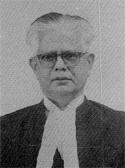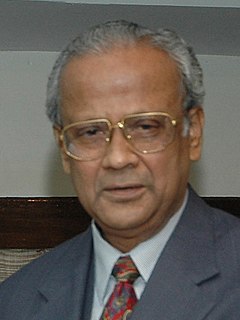Related Research Articles
The Best Bakery case was a legal case involving the burning down of the Best Bakery, a small outlet in the Hanuman Tekri area in Vadodara, Gujarat, India, on 1 March 2002. During the incident, a mob targeted the Sheikh family who ran the bakery and had taken refuge inside, resulting in the deaths of 14. This case has come to symbolize the carnage in 2002 Gujarat riots that followed the Godhra train Massacre. All the 21 accused were acquitted by the court due to shoddy police work and issues with evidence.

The 19167 / 19168 Sabarmati Express is an express train which connects the city of Ahmedabad in the western state of Gujarat to Varanasi city in the northern state of Uttar Pradesh through Jhansi. The train may take up to two days to complete the journey. It travels through Uttar Pradesh, Madhya Pradesh & Gujarat.
Chunilal Karsandas Thakker is a retired judge of the Supreme Court of India.
Bellur Narayanaswamy Srikrishna is an Indian jurist and a retired judge of the Supreme Court of India. From 1993–98, he headed the "Srikrishna Commission" that investigated causes and apportioned blame for the Bombay riots of 1992–93. He is currently the chairman of the Financial Sector Legislative Reforms Commission (FSLRC). and also works as an independent arbitrator.
The Godhra Train Burning was an incident that occurred on the morning of 27 February 2002, in which 59 Hindu pilgrims and karsevaks returning from Ayodhya, were killed in a fire inside the Sabarmati Express train near the Godhra railway station in the Indian state of Gujarat. The commission set up by the Government of Gujarat to investigate the train burning spent 6 years going over the details of the case, and concluded that the fire was arson committed by a Muslim mob of 1,000 to 2,000 people. A commission appointed by the central government, whose appointment was later held to be unconstitutional, stated that the fire had been an accident. A court convicted a group of 31 Muslim individuals for the incident and the conspiracy for the crime. The conviction was later upheld by the Gujarat High Court. The causes of the fire have yet to be proven conclusively. The event is widely perceived as the trigger for the Gujarat riots that followed, which resulted in widespread loss of life, destruction of property and homelessness. Estimates of casualties range from the official figures of 790 Muslims and 254 Hindus, to upwards of 2,000 casualties.

The 2002 Gujarat riots, also known as the 2002 Gujarat violence and the Gujarat pogrom, was a three-day period of inter-communal violence in the western Indian state of Gujarat. The burning of a train in Godhra on 27 February 2002, which caused the deaths of 58 Hindu pilgrims karsevaks returning from Ayodhya, is cited as having instigated the violence. Following the initial riot incidents, there were further outbreaks of violence in Ahmedabad for three months; statewide, there were further outbreaks of violence against the minority Muslim population of Gujarat for the next one year.
Girish Thakorlal Nanavati is a retired judge from the Supreme Court of India. After his retirement he headed two commissions inquiring into the 1984 Anti-Sikh riots and the Godhra riots.

Vishweshwar Nath Khare was the 33rd Chief Justice of India, serving from 19 December 2002 to 2 May 2004. He was a judge of the Supreme Court of India from 21 March 1997 before he was elevated to the post of Chief Justice.

Ehsan Jafri was an Indian politician and former member of the 6th Lok Sabha for the Congress Party, who was killed in the Gulbarg Society massacre, which was one of the episodes of mob violence against Muslims during the 2002 Gujarat riots.

Jayantilal Chhotalal Shah was the twelfth Chief Justice of India from 17 December 1970 until his retirement on 21 January 1971. He was born in Ahmedabad.
P. B. Sawant was a Supreme Court judge in India.
R.B. Sreekumar is a former Gujarat State Director-General of Police. He is known for his stand on the 2002 Gujarat riots against the Government of Gujarat.
Sanjiv Bhatt is a former Indian Police Service officer of the Gujarat-cadre. He is known for his role in filing an affidavit in the Supreme Court of India against the then Chief Minister of the Government of Gujarat, Narendra Modi, concerning Modi's alleged role in the 2002 Gujarat riots. He claimed to have attended a meeting, during which Modi allegedly asked top police officials to let Hindus vent out their anger against the Muslims. However, the Special Investigation Team appointed by the Supreme Court of India concluded that Bhatt did not attend this meeting, and dismissed his allegations.
Hosbet Suresh was a judge of the Bombay High Court who led a number of commissions that investigated violations of human rights.

The Naroda Patiya massacre took place on 28 February 2002 at Naroda, in Ahmedabad, India, during the 2002 Gujarat riots. 97 Muslims were killed by a mob of approximately 5,000 people, organised by the Bajrang Dal, a wing of the Vishva Hindu Parishad, and allegedly supported by the Bharatiya Janata Party which was in power in the Gujarat State Government. The massacre at Naroda occurred during the bandh (strike) called by Vishwa Hindu Parishad a day after the Godhra train burning. The riot lasted over 10 hours, during which the mob looted, stabbed, sexually assaulted, gang-raped and burnt people individually and in groups. After the conflict, a curfew was imposed in the state and army troops were called in to contain further violence.

Umesh Chandra Banerjee was a Bengali Indian jurist, who served as the chief justice of the Hyderabad High Court in 1998. He had also served as a permanent judge of the Calcutta High Court and as a judge of the Supreme Court of India.
Rekha Manharlal Doshit was the Chief Justice of Patna High Court, Patna in the Indian state of Bihar. The current chief justice is Justice Sanjay Karol.
The Nanavati-Mehta Commission is the commission of inquiry appointed by the government of Gujarat to probe the Godhra train burning incident of 27 February 2002. Its mandate was later enlarged to include the investigation of the 2002 Gujarat riots. It was appointed on 6 March 2002, with K. G. Shah, a retired Gujarat High Court judge, as its only member. It was later re-constituted to include G. T. Nanavati, a retired judge of the Supreme Court of India, after protests from human rights organizations over Shah's closeness to then-Gujarat Chief Minister Narendra Modi. Akshay H. Mehta, retired judge of the Gujarat High Court, replaced Shah when the latter died before the submission of the commission's interim report. Mehta was the same judge who had granted bail to Babu Bajrangi, the main accused of the Naroda Patiya massacre.
Jaideep Patel is a medical doctor who runs a pathology lab in Naroda, Ahmedabad, Gujarat in India. He served as the Gujarat state general secretary for Vishwa Hindu Parishad (VHP), a Hindu nationalist organisation, during the 2002 Gujarat riots.
Rahul Sharma is an ex-Indian Police Service (IPS) officer of the Gujarat cadre turned practicing lawyer with Gujarat High Court. He was inducted into the service in 1992. He played a crucial role in policing operations during the 2002 Gujarat riots. He was seconded to the Central Bureau of Investigation (CBI) in 2004, and served there for the next three years. Later, he served as the DIG at Rajkot, Gujarat until seeking voluntary retirement from active service in 2015.
References
- 1 2 3 "Hon'ble Mr. Justice Akshay H. Mehta". Gujarat High Court. Archived from the original on 1 May 2014. Retrieved 1 May 2014.CS1 maint: discouraged parameter (link)
- ↑ "Newly appointed justice Mehta of Nanavati Commission visits Godhra". IndLaw. UNI. Archived from the original on 3 December 2013. Retrieved 11 May 2013.CS1 maint: discouraged parameter (link)
- ↑ "Report of the Commission of Inquiry Consisting of Justice Nanavati and Justice Mehta" (PDF). Godhra and Gujarat Riots - Commission of Inquiry. Retrieved 30 April 2014.CS1 maint: discouraged parameter (link)